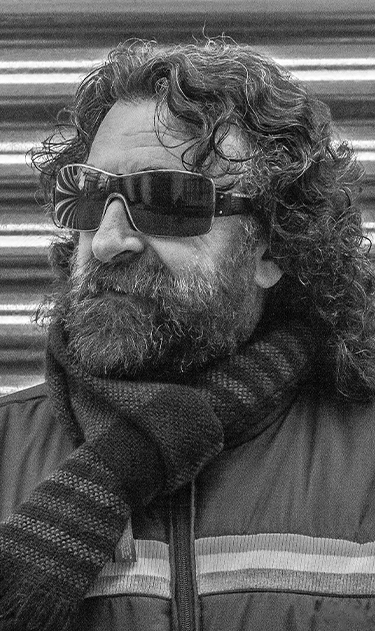Antonio García González (Chiclana de la Frontera, 1956), better known as Antonio Alemania, singer, composer and Carnival singer, stood out from a young age in the music of his homeland as the vocalist of the group ‘Los Mestizos’. He performed all the way to Barcelona with them as well as ‘Los Rumberos de Chiclana’, with flamenco roots but with a clearly festive air, with songs closely linked to his hometown, from Mi Rumbita to the song dedicated to Sancti Petri. His repertoire alternated rumbas with sevillanas.
However, his fame and prestige skyrocketed in the late 1970s in the field of comparsas, and especially when the famous author Enrique Villegas entrusted him with the direction of the comparsas he created. In the midst of the transition to democracy in Spain, Carnival groups emerged such as ‘Almas Alegres’ (1977), ‘Hombres del Campo’ (1979) with which he won the provincial contest, ‘Antifaz’ (1980), ‘Los Hijos de la Noche’ (1981), ‘Rancho Grande’ (1982), ‘Los Comuneros’ (1983) and, above all, ‘Las Quince Piedras’ (1984), which led to his recognition at the Gran Teatro Falla and in the Carnival celebrations that began to be revived, by then, in different parts of the province of Cádiz and Andalusia as a whole. His imposing figure and his unmistakable voice reigned in the world of coplas for a long time, while he perpetuated his excellent reputation as a director.
Later groups that saw success were ‘Los Braceros’ (1985), ‘Hombres Lobo’ (1986) and ‘Pescadores Fenicios’ (1987). After retiring from the stage in February 1987, he reappeared twenty-four years later as the director, composer and member of choirs such as ‘5 de Marzo’ (2011), in memory of the Battle of Chiclana, with Manuel Meléndez Butrón as lyricist, ‘Un Mundo Aparte’ (2012), ‘La Pluma’ (2013), ‘Los del Cuarto Curso’ (2014), ‘La Fiesta’ (2015), ‘Arriba el Telón’ (2016) and ‘La Hermandad Guerrera’ (2017).
His passionate connection with Carnival, his popularity and people’s affection for him, would lead him to be invited to inaugurate Carnival in Chiclana (1992), Cortes de la Frontera, Villamartín, Algeciras, Bornos and Arcos. He was also ‘Dios Momo’ (the god of festivities) at the Carnival of Cadiz in 2005.
After his initial retirement from Carnival, he launched his career as a composer and performer of sevillanas, such as El abuelo, whose lyrics would endear him to his followers: “Why is Grandpa sad?/He doesn’t play with me anymore/Or take me for a walk.”
His albums and his solo performances were applauded by the public. Flamencologist Antonio Escribano Ortiz defined him as “a disparate artist, full of interpretative strength, creative sensitivity and suited to varied musical tastes, but, above all, breathing the south through every pore of his skin”.
He continued to reap recognition in roles such as Pregonero de la Hermandad del Rocío in El Puerto de Santa María in 2011, Gold Badge of the Peña Carnavalesca Perico Alcántara, Langostino de Plata of the Peña Carnavalesca Hombres del Campo, Rey Mago in Chiclana in 2009 and winner of the FECAC Award for artistic work promoting popular culture, awarded by the Generalitat de Cataluña in 2009.
His social concerns have always been prioritised in his repertoire, which showcases both his personal joy and collective concerns. Married to Nina Delgado from Cádiz, the musician and singer is the father of three children, who follow in his footsteps as comparsistas and performers, as is the case of his daughter Nina, who has embarked on a solo singing career.
